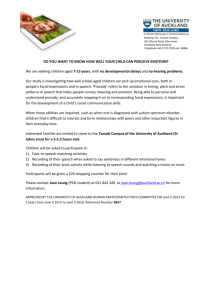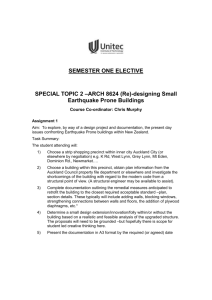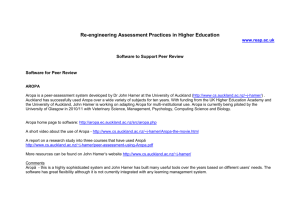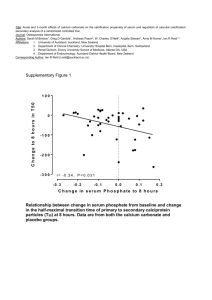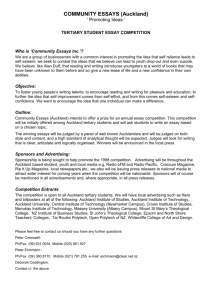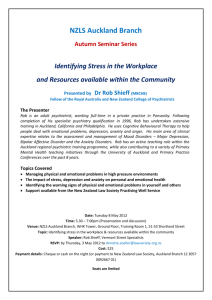Game Theory and Economics
advertisement
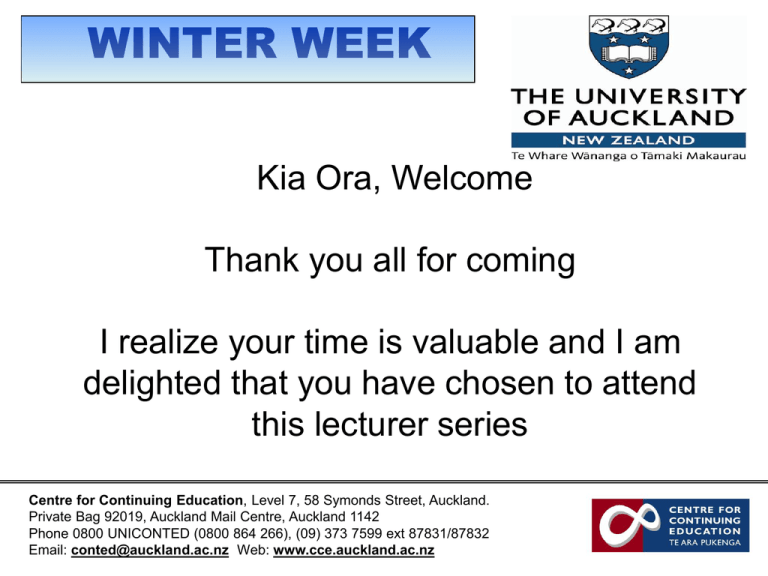
WINTER WinterWEEK Week Kia Ora, Welcome Thank you all for coming I realize your time is valuable and I am delighted that you have chosen to attend this lecturer series Centre for Continuing Education, Level 7, 58 Symonds Street, Auckland. Private Bag 92019, Auckland Mail Centre, Auckland 1142 Phone 0800 UNICONTED (0800 864 266), (09) 373 7599 ext 87831/87832 Email: conted@auckland.ac.nz Web: www.cce.auckland.ac.nz 1 WINTER WinterWEEK Week At this point I would like to request that you either shut off your cell-phone or put it in silent mode Let me now tell you very briefly how the five lectures are structured Centre for Continuing Education, Level 7, 58 Symonds Street, Auckland. Private Bag 92019, Auckland Mail Centre, Auckland 1142 Phone 0800 UNICONTED (0800 864 266), (09) 373 7599 ext 87831/87832 Email: conted@auckland.ac.nz Web: www.cce.auckland.ac.nz 2 WINTER WinterWEEK Week Today I am going to introduce some ideas and concepts that I will draw upon in later lectures The lectures on Tuesday and Wednesday are connected and deal with issues in cooperation and selfishness Centre for Continuing Education, Level 7, 58 Symonds Street, Auckland. Private Bag 92019, Auckland Mail Centre, Auckland 1142 Phone 0800 UNICONTED (0800 864 266), (09) 373 7599 ext 87831/87832 Email: conted@auckland.ac.nz Web: www.cce.auckland.ac.nz 3 WINTER WinterWEEK Week Thursday’s and Friday’s lectures are again connected and will deal with issues of fairness and trust If you miss the first lecture of a topic then the second lecture may make less sense Centre for Continuing Education, Level 7, 58 Symonds Street, Auckland. Private Bag 92019, Auckland Mail Centre, Auckland 1142 Phone 0800 UNICONTED (0800 864 266), (09) 373 7599 ext 87831/87832 Email: conted@auckland.ac.nz Web: www.cce.auckland.ac.nz 4 WINTER WinterWEEK Week It might be convenient for everyone if you hold questions till the end of the lecture However if during the lecture you have a question seeking clarification then please feel free to ask that question Centre for Continuing Education, Level 7, 58 Symonds Street, Auckland. Private Bag 92019, Auckland Mail Centre, Auckland 1142 Phone 0800 UNICONTED (0800 864 266), (09) 373 7599 ext 87831/87832 Email: conted@auckland.ac.nz Web: www.cce.auckland.ac.nz 5 WINTER WinterWEEK Week At times I might ask you to defer your question till the end of the lecture If I do so then it does not imply any disrespect It simply means that trying to answer the question may take me far away from what I am talking about and it would be easier to answer it later Centre for Continuing Education, Level 7, 58 Symonds Street, Auckland. Private Bag 92019, Auckland Mail Centre, Auckland 1142 Phone 0800 UNICONTED (0800 864 266), (09) 373 7599 ext 87831/87832 Email: conted@auckland.ac.nz Web: www.cce.auckland.ac.nz 6 University of Auckland Winter Week Lectures First Lecture 2 July 2007 Associate Professor Ananish Chaudhuri Department of Economics University of Auckland 7 Game Theory and Experimental Economics • A large number of decisions in every day life require strategic decision making • Economists have developed a broad array of tools to understand how people make decisions in such situations • These set of tools are called “Game Theory” 8 What is Game Theory? • Game theory is a language for describing strategic interactions when what happens to one person is affected by another person • A large number of situations that confront us in our day to day lives can be thought of as “games” with us as “players” • And they can be analyzed using the tools of game theory 9 Games in everyday life • Tennis players deciding whether to serve to the forehand or backhand of their opponent • The local bakery offering a discounted price on pastries just before it closes • Employees deciding how hard to work when the boss is away 10 Games in everyday life • Persian rug seller deciding how quickly to lower the price when haggling with a tourist • Airline companies trying to decide whether to cut prices or not • Qantas and Air New Zealand trying to decide whether to merge or not • And the response of competitors to a merger 11 Games in everyday life • Lamalera man in Indonesia deciding whether to join the group for the day’s whale hunt or to fish on his own • Pharmaceutical firms investing in research to develop a new drug • People bidding for art or oil leases or knickknacks on eBay 12 Pioneers of Game Theory • Economists have developed a large body of theory which enables us to understand and analyze the nature of the interaction between players in such games • A lot of what we know can be traced back to John von Neumann and Oskar Morgenstern • As well as John Nash (played by Russell Crowe in “A Beautiful Mind”) along with Reinhard Selten and John Harsanyi • The latter three together won the Nobel Prize in Economics in 1994 13 Behavioral Economics • Game theory is used extensively now in economics, biology, sociology, political science, and all branches of businessrelated disciplines such as management and marketing • My own research focuses on one part of game theory that can be called “behavioral game theory” • I try to understand what the theory says about how people would behave and how they actually respond in many such strategic situations – often by providing monetary incentives 14 Contributing to a charitable cause – a social dilemma • I am going to illustrate some of these issues with the aid of an example • You want to build a park in your locality that would be open to everyone • You decide to approach the families in the area and ask them to donate a certain amount 15 Contributing to a charitable cause – a social dilemma • Not everyone has to contribute for the park to get built • As long as some of the families contribute you will have enough money for the park • What are the chances that you will be able to raise enough money? 16 Contributing to a charitable cause – a social dilemma • Let us assume that by and large people are self-interested and care (mostly) about their own welfare • Think about an individual trying to decide whether to contribute or not • If she does not contribute and the park does not get built then she is neither better nor worse off • But suppose she does NOT contribute but enough money is raised to build the park 17 Contributing to a charitable cause – a social dilemma • This person cannot be prevented from going to the park once it is built • She has not contributed anything but still gets to enjoy a walk in the park • This person is then strictly better off 18 Contributing to a charitable cause – a social dilemma • Seems like then that whether the park gets built or not – for an individual who cares primarily about her own self-interest – the thing to do is not to contribute any money • We call this “free-riding” • But if everyone reasoned along the same lines then no one will contribute! 19 Economic situations as games • A number of economic situations in real life resemble this scenario • And they can be depicted as a simple game played by two players 20 The Prisoners’ Dilemma • Economists refer to situations like these as a “prisoners’ dilemma”! • We can set up the situation on a table, called a Payoff Matrix 21 The Prisoners’ Dilemma • Here is how it goes: • A crime is committed. The police have no evidence but want to get a conviction. So they arrest a couple of likely characters, Ginger and Rocky, and put them in different cells. 22 The Prisoners’ Dilemma • The police say to each suspect: • “If you rat on your mate and finger him for the crime and he doesn’t rat on you, then we can convict him and he will get 7 years in prison, and we will let you go free.” • “So what if I don’t rat and nor does he?” asks Rocky (or Ginger). “ Then you can’t convict, can you?” 23 The Prisoners’ Dilemma • “No we can’t,” admits the detective. “But then we’ll pin an obstruction of justice charge on both of you. One year in the slammer each.” • “And if we both rat on each other?” • “Then it gets a bit messy and you both get 5 years,” says the 24 detective. The Prisoners’ Dilemma • So what will happen? Let us figure out the options from Rocky’s point of view. • Being economists, we will assume that Rocky is “rational” meaning that he will do the best he can in his own self-interest • Rocky considers each possible action by Ginger, and figures out his best reaction in each case 25 The Prisoners’ Dilemma • So if Ginger rats on Rocky, then Rocky’s best move would be to rat on Ginger (get five years instead of seven) • And if Ginger doesn’t rat, then Rocky’s best move is…….. • again, to rat! (go free instead of one year in prison) 26 The Prisoners’ Dilemma • So Rocky’s rational decision must be to rat on Ginger. • And, similarly, Ginger’s best move is to rat on Rocky • So we predict this is what will happen and they both will go to prison for five years • But if only both could have kept their mouths shut, they would both be better off!!! 27 The Prisoners’ Dilemma Payoff Matrix ROCKY GINGER Don’t Rat Rat Don’t Rat Ginger: 1 year Rocky: 1 year Ginger: free Rocky: 7 years Rat Ginger: 7 years Rocky: free Ginger: 5 years Rocky: 5 years 28 The Prisoners’ Dilemma from Ginger’s perspective ROCKY GINGER Don’t Rat Rat Don’t Rat Rat 1 year 7 years Free 5 years 29 The Prisoners’ Dilemma • The problem is that even if one prisoner does the right thing and keeps quiet, the other has an incentive to cheat on him • Similarly in the case of the park it would be better if everyone contributes, but self-interested individuals have an incentive not to do so • But if no one contributes then the park does not get built 30 Experimental Evidence • It turns out that people often choose the cooperative strategy in Prisoner’s Dilemma type situations • People contribute to public charities • People voluntarily save on electricity consumption when asked to do so in the face of a crisis • The puzzle of course is why since that behavior is not in accordance with individual self-interest 31 Implications of Cooperation • The issue of cooperation goes beyond economics and has ramifications for other disciplines including theories of evolution • Biological theories suggest that those who act altruistically or cooperatively in such situations will lose out to those who act in their own self-interest • Over time the self-interested types will come to dominate the population 32 Before I proceed • Since this is a talk on experiments and strategic decisions making, why don’t we play a game? • This will help to set-up the rest of my talk • I will pick some volunteers in a minute • Your job is to pick a WHOLE number between 0 and 100 • Whoever gets closest to ONE-HALF of the AVERAGE of all the numbers picked 33 WINS!!! Before I proceed • Each of you will write down a number between 0 and 100 on a slip of paper and hand it to me • I will then calculate the average (and onehalf of the average) of all the numbers chosen • Then I will see whose number came closest to one-half of the average and that person is the winner 34 Before I proceed • Please write your name or initials on the slip of paper since we need to identify you to give you your reward • The reward is $25 (to be divided among the winners in case of a tie) • I will tell you the winner and the answer to the game when we are done 35 Answer to the Guessing Game • Suppose everyone chooses 100 • Then the average is 100 • Since I have to get closest to ½ of 100, I should choose 50 • But if everyone figured that out then everyone will choose 50 • Then the average will be 50 • Then I should choose (1/2 of 50) = 25 36 Answer to the Guessing Game • But if everyone figured that out then they will all choose 25 • Then I should choose 12.5 and so on and so forth…till 0! • But wait…how smart are my group members? 37 Answer to the Guessing Game • How many levels of such reasoning can they engage in? • If they can think through only two steps then maybe I should stop at 25… • In this case the answer turns out to be… 38 Questions? 39

